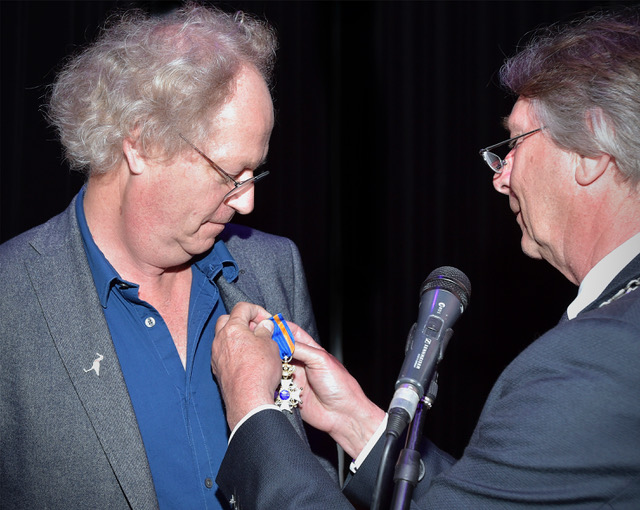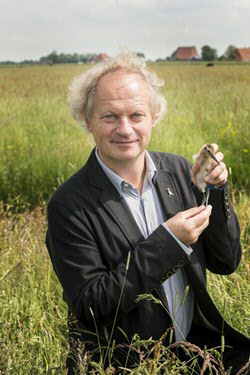Royal Decoration for Theunis Piersma

On 4 April 2017, internationally renowned migratory bird ecologist Prof. Theunis Piersma has received a Royal Decoration by H.H. Apotheker, Mayor of the municipality of Súdwest-Fryslân. He has been appointed Knight of the Order of the Netherlands Lion.
The presentation took place at the debate evening on the Northern Netherlands testing ground for sustainable landscapes in Workum.
Pioneer in research into the ecology and evolution of migratory birds
Theunis Piersma (Hemelum, 1958) is Professor of Global Flyaway Ecology at the University of Groningen and senior researcher with the Royal Netherlands Institute for Sea Research (NIOZ). He has a reputation throughout the world as a pioneer in research into the ecology and evolution of migratory birds. His work covers all the major global migration routes of migratory birds, particularly waders and meadow birds: from Canada to South America, from Northern Europe to Africa and from Siberia to Australia and New Zealand via China. Much of Piersma's research appeals to the imagination: for example, he has shown that bar-tailed godwits fly up to 13,000 km between their breeding grounds in Alaska and the areas where they winter in New Zealand.
Piersma's research has led to numerous new scientific discoveries. His comparative studies are unique throughout the world. One of his discoveries was that migratory birds can change the structure of their bodies radically in order to adapt to the diverse conditions they encounter on their journeys. His book about this ability of individuals to adapt (entitled The Flexible Phenotype) was an important milestone in the development of ideas about this phenomenon, and forms the basis of a lot of other scientific research.

Backbone of major international research network
Piersma has always been particularly interested in training young researchers. He has supervised numerous PhD students, many of whom developed into the best PhD students in their field. He is also the backbone and a great source of inspiration for a huge international network of researchers in the field of migratory birds. One of his strongest points is the way he inspires colleagues to perform to the very best of their ability.
He has received several scientific awards, including the Spinoza Prize from the Netherlands Organisation for Scientific Research (NWO) in 2014, membership of the Fryske Akademy in 2001 and membership of the Royal Netherlands Academy of Arts and Sciences (KNAW) in 2009.
Scientific basis for nature conservation
Piersma has mastered the art of translating his research findings into language that can be understood by policymakers and nature conservation organizations in the Netherlands and abroad. His work not only constitutes a major contribution to fundamental science, but has also had a considerable impact on society. His long-term study of waders and their food sources in the Wadden Sea provided important input during discussions of the damaging effects of large-scale mechanical cockle fishing in the Wadden Sea. In fact his work was ultimately a decisive factor in providing nature organizations with the evidence they needed to implement a total ban on mechanical cockle fishing in the Wadden Sea.
He has also carried out pioneering work at an international level around the edges of China’s Yellow Sea, which are under threat due to reclamation. An article he published in the leading journal Science focused attention on the current alarming speed at which the habitat in this area is being destroyed. His work on nature conservation in countless places around the globe makes Piersma a force to be reckoned with.
Kening fan ’e Greide
But Piersma is not only a world authority on wading birds; he also specializes in meadow birds, particularly godwits. He combines his pioneering research with a huge contribution to a unique social transition currently taking place in the province of Friesland. He was one of the instigators of Station Fryslân 2018, a citizens’ platform aiming to formulate a new course for the Frisian landscape. In 2012, the citizens’ initiative established ‘Kening fan ’e Greide’ (King of the Meadow, referring to the godwit), of which he is one of the founding fathers. The initiative involves farmers and residents of rural areas working alongside scientists and artists to promote sustainable attitudes to nature and the landscape.
Popularizing science
Piersma spends a lot of his time (including spare time) popularizing science in his field and promoting social change. He aims to reach professionals (ministries, nature organizations etc.) as well as the public at large. His approach is unique, characteristic and creative. He and the composer and ornithologist Sytze Pruiksma fill halls and theatres, linking their tales of migratory birds to the feelings of the landscape through a musical production in which he manages to convey complex scientific messages in a way that everyone can understand. In 2016, he presented the results of his research in a two-day seminar during the Oerol Festival on Terschelling, portraying his account of waders through dance, stories and experiment.
Piersma has another unique instrument for expressing his enthusiasm about the importance of the nature around him; his native language - Frisian. In 2015, he wrote ‘Sweltsjes fan Gaast’, a personal book in Frisian about common house martins nesting under the gutter of his house. Not long afterwards, the book was translated into Dutch and English. It is one of very few books to have been translated from Frisian.
| Last modified: | 14 April 2020 12.28 p.m. |
More news
-
21 November 2024
Dutch Research Agenda funding for research to improve climate policy
Michele Cucuzzella and Ming Cao are partners in the research programme ‘Behavioural Insights for Climate Policy’
-
13 November 2024
Can we live on our planet without destroying it?
How much land, water, and other resources does our lifestyle require? And how can we adapt this lifestyle to stay within the limits of what the Earth can give?
-
13 November 2024
Emergentie-onderzoek in de kosmologie ontvangt NWA-ORC-subsidie
Emergentie in de kosmologie - Het doel van het onderzoek is oa te begrijpen hoe ruimte, tijd, zwaartekracht en het universum uit bijna niets lijken te ontstaan. Meer informatie hierover in het nieuwsbericht.
